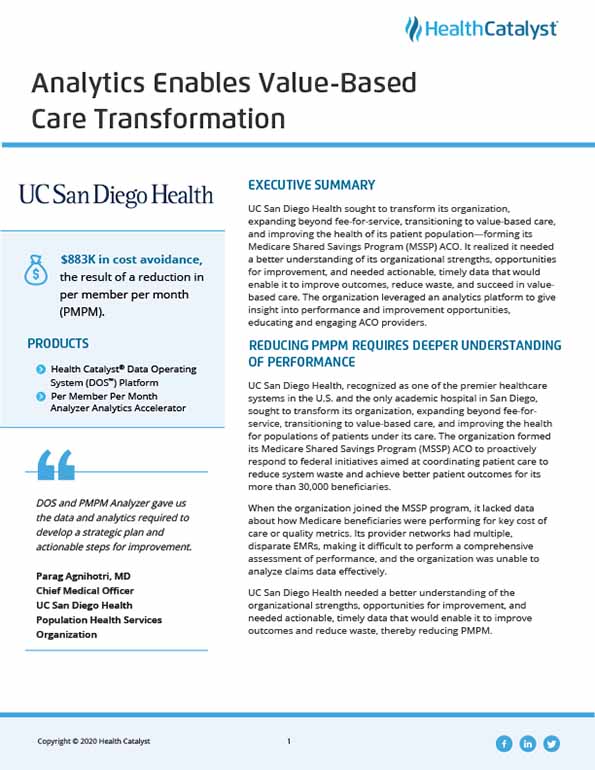UC San Diego Health sought to transform its organization, expanding beyond fee-for-service, transitioning to value-based care, and improving the health of its patient population—forming its Medicare Shared Savings Program (MSSP) ACO. It realized it needed a better understanding of its organizational strengths, opportunities for improvement, and needed actionable, timely data that would enable it to improve outcomes, reduce waste, and succeed in value-based care. The organization leveraged an analytics platform to give insight into performance and improvement opportunities, educating and engaging ACO providers.
UC San Diego Health, recognized as one of the premier healthcare systems in the U.S. and the only academic hospital in San Diego, sought to transform its organization, expanding beyond fee-for-service, transitioning to value-based care, and improving the health for populations of patients under its care. The organization formed its Medicare Shared Savings Program (MSSP) ACO to proactively respond to federal initiatives aimed at coordinating patient care to reduce system waste and achieve better patient outcomes for its more than 30,000 beneficiaries.
When the organization joined the MSSP program, it lacked data about how Medicare beneficiaries were performing for key cost of care or quality metrics. Its provider networks had multiple, disparate EMRs, making it difficult to perform a comprehensive assessment of performance, and the organization was unable to analyze claims data effectively.
UC San Diego Health needed a better understanding of the organizational strengths, opportunities for improvement, and needed actionable, timely data that would enable it to improve outcomes and reduce waste, thereby reducing PMPM.
To improve insight into performance and ability to advance population health, UC San Diego Health partnered with Health Catalyst, implementing the Health Catalyst® Data Operating System (DOS™) platform and a robust suite of analytics applications, including the Per Member Per Month Analyzer analytics accelerator. DOS combines capabilities of data warehousing, clinical data repositories, and health information exchanges in a single, common-sense technology platform. PMPM Analyzer provides claims-based data and visualization to support a holistic evaluation of PMPM payment performance drivers.
The health system leveraged the analytics accelerator and Health Catalyst population health services assessment to prioritize investing in activities to improve population health and decrease cost. Using the analytics accelerator, the organization could understand how its ACO providers, members, and specialty areas were contributing to overall PMPM payment performance. It conducted analyses to identify and understand the factors driving PMPM performance, selecting several high impact areas for improvement.
UC San Diego Health utilizes the ACO program to engage and educate its ACO providers, including affiliate and faculty practices, on how to succeed in value-based care. The population health team partnered with its ACO providers to lower avoidable admissions, improve care for various conditions post-discharge, and decrease post-acute care usage.
Deploying a care management team, UC San Diego Health leveraged the analytics accelerator to provide the team with the required data to identify practices and members with the greatest improvement opportunities. Care managers engage with high-risk members, addressing their unique care needs.
Practice managers use data from the analytics accelerator to ensure members who are the highest utilizers are seen by the primary care practice, rather than delaying care and seeking treatment from high-cost providers, such as the emergency department.
When members are admitted to the hospital, they receive care management and support inpatient, with support continued after discharge. UC San Diego Health ensures smooth care transitions, engaging the care management team to work with patients to determine the safety of the member being discharged home, or if discharge to a skilled nursing facility (SNF) is more appropriate. The organization then contacts members to ensure the appropriate primary care practice sees them post-discharge.
Advanced registered nurse practitioners (ARNPs) and physicians perform rounds and assess patients in SNFs to make sure appropriate services are provided. ARNPs also perform home visits, engaging with high-risk members at home.
The population health team routinely shares data and analyses with primary care practices, including discussions at large collaborative meetings, and one on one sessions with practices and practice managers.
UC San Diego Health’s data-informed improvements have lowered waste and decreased costs, including reducing PMPM. In one year, the organization achieved:
“DOS and PMPM Analyzer gave us the data and analytics required to develop a strategic plan and actionable steps for improvement.”
– Parag Agnihotri, MD, Chief Medical Officer, UC San Diego Health, Population Health Services Organization
UC San Diego Health plans to continue its data-driven transformational journey and will keep advancing its population health efforts, improving outcomes, and decreasing waste.


